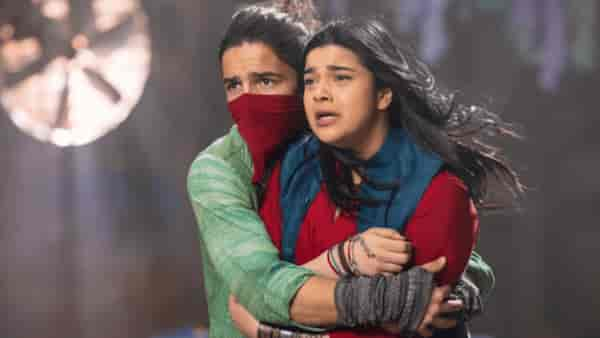Ms. Marvel Episode 5 review: Kamala Khan goes back in time, but brings back nothing
Like a couple of Marvel's earlier series, Ms. Marvel exhibits the penultimate syndrome, in which the storyline almost gets forgotten.

Last Updated: 02.36 PM, Jul 06, 2022
As seen through the eyes of Kamala's great-grandmother Aisha, her husband Hasan, and finally their small daughter Sana (Kamala's grandma), Episode 5 is primarily a flashback. Aisha has separated from the other clandestine and is content with her new existence, but when Najma reappears and poses a threat to everyone, she realises they must flee. Partition serves as the backdrop for all of this as Aisha fights valiantly to get her family to safety. Kamala has heard the tale of Sana, who got lost from Hasan on the train platform but eventually found her way back to him by following a "trail of stars" her entire life.
According to a news article shown as the episode starts, this is a new era for India because the British have finally ceased their dominion over the nation. As a result, Pakistan has been set aside for Muslims, and as people cross various borders, an unparalleled migration has started. However, as people escape, there have been riots and acts of violence all around the nation as a result of these recent upheavals. In order to fully comprehend what is going on, we must return to 1942.
Aisha (Mehwish Hayat) is seen fleeing a British soldier at that location. She turns and tosses a dagger squarely into his chest after finally approaching him. When Aisha arrives at a village center, a man, aah, there comes Fawad Khan, is standing outside, telling his people that this is their home and that they will fight for it if necessary. A group of troops arrive and disperse the assembly, cutting off his address and sending everyone home.
As she wanders, Aisha ultimately finds a field of flowers where she may spend the night. The same villager gently wakes her up and tells her to quit dozing off on his roses. Aisha is curt with him and declines any assistance when he asks if he can help her with anything. He still invites her into his house, providing her with food and a place to stay. Despite her hesitation, Aisha accepted his invitation that evening.
The man inquires if Aisha has a name or if he should just refer to her as "hungry." He presses harder when Aisha doesn't answer, saying that he is aware that she is not British and is not from this village, so what is she doing here? He begins his favourite poetry when Aisha comments on how much she likes his roses: "When the soul lies down on that grass, the world is too full to talk about." That which you seek is drawn to you. Aisha interrupts him and continues, telling him her name before he can finally give it to her: Hasan.
Going by the first few minutes of the show, love blossoms between Aisha and Hasan, and they create their own world in that small village. Soon after, they welcome their baby girl, Sana, who becomes the centre of their universe. The love story and India's fight for freedom run parallelly. It also gives a glimpse into how the British were successful in divide and rule, wherein Hasan and his family are isolated completely by the villagers because he is a Muslim.
The love story is a literal comic to screen translation, and they have shown the portrayal of the gut-wrenching partition very beautifully. Along with that are the beautiful performances by Khan and Hayat, who are hot favourites in Pakistan. But like Farhan Akhtar, Khan's screentime was also limited and was zeroed down to be the charming Hasan, who made Aisha forget that she was clandestine and her presence was only magical in his life.
The main purpose of the flashback is to solve the mystery of how Sana followed a "trail of stars" and made it to her father after they got separated briefly. However, the punch lacks in the conclusion of the story as it gives a major déjà vu moment from Harry Potter and the Prisoner of Azkaban, where Harry Potter thinks it's his father, James Potter, who is going to save Sirius Black and him from the Dementors.
After the flashback sequence, we also see three generations reuniting and Muneeba (Zenobia Shroff) knowing about her daughter Kamala's powers. However, the shock value, which one expects or has seen in many instances, has been absent.
Moreover, the CGI in a few sequences in the latest episode looked very poor, especially when a few characters turned into skeletons. There are ways in which these scenes could have been dealt with, but it turned out very poorly.
The penultimate episode has become the shortest of all, with a 38-minute runtime. The major disappointment was that the information was kind of given about the back story and the episode didn't add any value to the show. Not just that, with the way the episode ended, you might have waited for something to happen, but the end credit starts with Tu Jhoom, a song by Abida Parveen and Naseebo Lal.
Ms. Marvel is set to end next week, and I'm not sure how they intend to wrap it up and integrate it into the MCU and, eventually, Avengers. The episode showed Kamala showcasing her powers, but for just a few minutes and very out of place too.
Ms. Marvel, like a few of the previous shows by Marvel, is suffering from the penultimate syndrome, where the plot is almost lost. Not sure, if this time Marvel will be picking up and delivering the befitting conclusion to the teenage superhero who has a major connection back in the time of the Indian-Pakistan partition in 1947.

 Premium
Premium